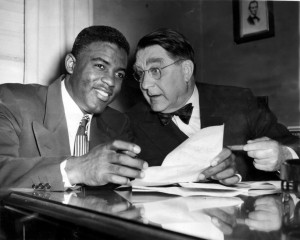print Print...

Jackie Robinson and Branch Rickey.
(by Chris Lamb, The Wall Street Journal) – Brooklyn Dodgers President Branch Rickey first met Jackie Robinson on Aug. 28, 1945. Rickey told Robinson that he wanted to sign the 26-year-old ballplayer and break the national pastime’s color barrier. But for him to succeed, Rickey said, Robinson couldn’t respond to the indignities that would be piled on him: “I’m looking for a ballplayer with guts enough not to fight back.”
Rickey then opened a book published in the 1920s, Giovanni Papini’s “Life of Christ,” and read Jesus’ words: “But whoever shall smite thee on the cheek, turn to him the other also.” Robinson knew the Gospel and knew what was required of him. He replied, “I have two cheeks, Mr. Rickey. Is that it?” This meeting between the two Methodists, Rickey and Robinson, ultimately transformed baseball and America itself. …
What is often overlooked in accounts of Robinson’s life is that it is also a religious story. His faith in God, as he often attested, carried him through the torment and abuse of integrating the major leagues.
Robinson grew up in Pasadena, Calif., where his mother, Mallie, instilled in her five children the belief that God would take care of them. “I never stopped believing that,” Robinson later said.
It took awhile for Robinson as a young man to understand what that faith in God meant. He was involved in more than one fight, and scrapes with the law, prompted by racial antagonism. Arnold Rampersad, in his 1997 Robinson biography, describes how the teenager was rescued from the streets by the Rev. Karl Downs, the minister of Scott United Methodist Church in Pasadena. Downs became a father figure to Robinson and brought him back into the church. …
After serving in the U.S. Army during World War II, Robinson, who had been a stand-out athlete at UCLA, signed up in the spring of 1945 to play baseball for the Kansas City Monarchs in the Negro Leagues. Robinson openly scorned his whiskey-drinking and promiscuous teammates, once tossing a glass of scotch into a lighted fireplace to demonstrate how lethal liquor is. He also stunned his teammates by declaring that he was waiting until he was married to have sex.
As influential as Rev. Downs had been, though, no one had a more profound impact on Robinson’s life than Branch Rickey, whose religious devotion was such that he didn’t attend baseball games on Sundays. During their first meeting, after Rickey had read aloud the passage from Papini’s “Life of Christ,” he also asked Robinson to read from the section about “nonresistance.” Robinson understood what was needed for him to succeed.
Nobody in sports had ever faced the sort of pressure, and abuse, that Jackie Robinson did when he took the field for the first time in a Brooklyn uniform on April 15, 1947. And yet Robinson didn’t merely endure, he thrived.
In a 1950 newspaper interview, he emphasized his faith in God and his nightly ritual of kneeling at bedside to pray. “It’s the best way to get closer to God,” Robinson said, and then the second baseman added with a smile, “and a hard-hit ground ball.”
After Robinson retired from baseball, he wrote newspaper columns for the New York Post and the Amsterdam News in New York. Many of the columns are collected in a new book, “Beyond Home Plate,” edited by Michael G. Long. Writing for the Post in 1960, Robinson compared his own experience with “turning the other cheek” with the nonviolent confrontation of the civil-rights movement espoused by his friend, Martin Luther King Jr.
“I can testify to the fact that it was a lot harder to turn the other cheek and refuse to fight back than it would have been to exercise a normal reaction,” Robinson wrote. “But it works, because sooner or later it brings a sense of shame to those who attack you. And that sense of shame is often the beginning of progress.”
Mr. Lamb, a journalism professor at Indiana University in Indianapolis, is the author of “Blackout: The Untold Story of Jackie Robinson’s First Spring Training” (University of Nebraska, 2004).
Published April 11, 2013 at The Wall Street Journal. Reprinted here April 17, 2014 for educational purposes only. Visit the website at wsj .com.
Questions
1. The purpose of an editorial/commentary is to explain, persuade, warn, criticize, entertain, praise or answer. What do you think is the purpose of this editorial? Explain your answer.
2. From pbs:
In 1947, a major breakthrough of the color line in sports occurred when Jackie Robinson, a 28-year-old African-American ballplayer and war veteran, was brought up from the minor leagues to play for the Brooklyn Dodgers. The nation was divided at first. Many whites and nearly all blacks applauded the move and said it was long overdue. But a large number of whites, including many major league baseball players, objected to his presence. Although most of the press supported Robinson, some newspapers were opposed.
Robinson knew that his presence on the playing field would cause resentment. He anticipated that some pitchers would aim pitches at his head and that other players would try to injure him on the basepaths.
One Southern player, Enos “Country” Slaughter of the St. Louis Cardinals, spiked Robinson particularly brutally, causing a seven-inch gash. Ballplayers and fans would shout epithets of [the N word] at him when he came to bat. He also was aware that a few rabid racists might try to kill him — or at least scare him with death threats. But despite all of these pressures, Robinson played extremely well. He was a solid hitter, an outstanding base stealer, and he excelled defensively. He handled the pressure well… The Sporting News, a newspaper that had opposed blacks in the major leagues, gave Robinson its first Rookie of the Year Award in 1947; the award was renamed in Robinson’s honor in 1987.
Robinson’s action had repercussions far beyond the sports world. Robinson’s integration of baseball was a major blow to segregation everywhere, causing other racial barriers to fall. Robinson himself spoke out against Jim Crow laws. He criticized hotels that refused to let him stay with his teammates and teams that refused to hire black players. A number of hotels and restaurants where the Dodgers stayed integrated as a result. Robinson’s outstanding 10-year career included a .311 lifetime batting average, playing in six World Series, and stealing home 19 times. He also won the National League Most Valuable Player award in 1949, when he led the league with a .342 batting average and 37 stolen bases. He was elected to the Baseball Hall of Fame.
Robinson wrote, “I can testify to the fact that it was a lot harder to turn the other cheek and refuse to fight back than it would have been to exercise a normal reaction.” How does Jackie Robinson’s decision to follow the teaching of Jesus in his life inspire you?
(Read the passage from the Bible that Jackie Robinson followed: from Matthew 5: 33-48, Jesus said:
“Again you have heard that it was said to those of old, ‘You shall not swear falsely, but shall perform your oaths to the Lord.’ But I say to you, do not swear at all: neither by heaven, for it is God’s throne; nor by the earth, for it is His footstool; nor by Jerusalem, for it is the city of the great King. Nor shall you swear by your head, because you cannot make one hair white or black. But let your ‘Yes’ be ‘Yes,’ and your ‘No,’ ‘No.’ For whatever is more than these is from the evil one.
“You have heard that it was said, ‘An eye for an eye and a tooth for a tooth.’ But I tell you not to resist an evil person. Whoever slaps you on your right cheek, turn the other to him also. …
“You have heard that it was said, ‘You shall love your neighbor and hate your enemy.’ But I say to you, love your enemies, bless those who curse you, do good to those who hate you, and pray for those who spitefully use you and persecute you, that you may be sons of your Father in heaven; for He makes His sun rise on the evil and on the good, and sends rain on the just and on the unjust. For if you love those who love you, what reward have you? Do not even the tax collectors do the same? And if you greet your brethren only, what do you do more than others? Do not even the tax collectors do so? Therefore you shall be perfect, just as your Father in heaven is perfect.

